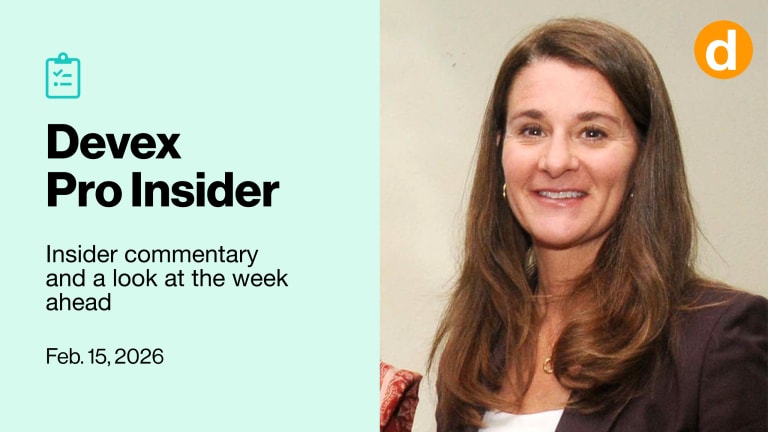Devex Pro Insider: A funder comes out swinging — and what’s next from Melinda
By David Ainsworth // 28 April 2025
It’s been a busy week for Devex reporters, who’ve been out and about covering not one but two major Washington, D.C., events: the World Bank-IMF Spring Meetings and the Global Inclusive Growth Summit. The Spring Meetings have been a low-key affair for delegates, but they’ve drawn more press interest than normal, not least thanks to rumors that the U.S. government might decide to pull out of the World Bank altogether. But there have also been stories of major new assaults on development sector institutions. The Millennium Challenge Corporation, a bipartisan U.S. government agency, is offering its 300 staffers early retirement or “deferred resignation,” and it looks increasingly likely that much of its $900 million annual budget will be cut. And there has been talk for days, so far unconfirmed, that the government will go after the tax breaks of climate organizations and foundations that give money overseas. We’ll be bringing you updates on all of that below. Bits and pieces The World Bank is not enough. You might have expected the shadow of Trump to hover over the World Bank Spring Meetings this week, much as it has over the rest of the world economy. My colleagues who are on the ground tell me that it feels surprisingly like business as usual — but that at the same time, things are very quiet, and there’s a significant lack of substantive proposals. One of the biggest talking points — whether the U.S. would pull out of the bank altogether — appears to have been put to bed. U.S. Treasury Secretary Scott Bessent moved to quell rumors on Wednesday, albeit with some punchy warnings that he wasn’t happy with the direction of travel. Another major issue was climate, and whether the bank, which had recently pivoted toward climate funding, would perform an abrupt heel turn away again. Not so, it appears. The bank is sticking it out, although there does appear to have been a level of rebranding, and “climate” doesn’t seem to have made it into the title of many sessions. Finally, though, there’s the burning question of debt, which is arguably the biggest development issue facing low- and middle-income countries, but something that governments from the global south continue to struggle to get on the table. My colleague Jesse Chase-Lubitz has an excellent explainer on why tariffs look likely to make the debt question worse, as well as some news about a new IMF playbook, which should hopefully help countries make progress. All at sea at MCC. After DOGE closed down USAID, the budget-slashing department followed up with other, smaller agencies, such as USADF and the Inter-American Foundation. One organization that many thought would be spared is the Millennium Challenge Corporation, which was founded under George W. Bush, and is widely seen as an effective tool to counter Chinese influence worldwide. But that doesn’t seem to be the case. Staffers received an email Tuesday that said: “While the Foreign Assistance Review has not yet concluded, we understand from the DOGE team there will soon be a significant reduction in the number of MCC’s programs and relatedly the agency’s staff.” It’s uncertain what will happen to the agency’s $900 million a year budget, largely delivered through grant agreements known as compacts. At present, it appears that the agency has been told to wind down all existing agreements and make no further progress with new ones. Shaky foundations. We’re also not a lot further forward on another rumor swirling around Washington — that the government was considering revoking the tax-exempt status of several nonprofits, including climate organizations and foundations that send money outside the United States. For several days, we’ve heard that executive orders might be coming on these topics, but so far, there’s been no action. One White House official is reported in Reuters as saying that “no such orders are being considered” for climate nonprofits. In most administrations, you’d think that would be the end of it, but for now, philanthropies remain on high alert. Starr turn. One organization that’s not fighting shy is the Mulago Foundation, whose chief executive, Kevin Starr, is known for speaking his mind. “Trump’s latest outrage is this threatened revocation of tax-exempt status for conservation and climate organizations,” he wrote on LinkedIn last week. “Everybody is scrambling to do something, anything, to escape the consequences of one more illegal grab for power, one more step toward authoritarianism. Here’s what Mulago is doing: Nothing. Not deleting target words, not racking up legal bills, not moving money around—none of it.” He went on to urge courage and unity. “They can’t come for all of us,” he wrote, “and it is especially up to funders to stand up and speak out.” Farce majeure. Starr wasn’t finished with the hot takes, though. He also had some choice words for Jeff Skoll, founder of the eponymous Skoll World Forum, which took place earlier this month, and which Starr recently attended. Skoll had posted several tweets before and shortly after the inauguration praising DOGE, Elon Musk, and his family, before abruptly stopping again. The motivation for Skoll’s Musk-fest has never been entirely clear. If Skoll’s personal politics have indeed changed, it’s odd that he then laid down $25 million of his own money to fund organizations hit by what he called “inhumane cuts” just weeks later. Skoll, Starr wrote, had “bellied up to the bar of power” and then failed to acknowledge doing so. This lack of clarity, he said, had created a week “bordering on farce.” If you’re interested in more of the forum, you can read my own take on it here. GIGS economy. Don’t bet against the middle class. That’s one of the main takeaways from The Global Inclusive Growth Summit, which took place a stone’s throw from the World Bank meetings on Thursday. (Technically, around five stones’ throws, if you were using the Warwolf trebuchet of Edward I, reputed to be the largest catapult of all time, but we digress). It’s easy to feel a bit hopeless at times like this, with development funding dropping and the megarich acquiring an ever larger share of the world’s assets, but the event had a message of hope. The meeting heard that the middle class is still growing fast, especially in Asia, where 1.1 billion people will move from “poor” to “middle class” in the next 10 years. Gates opens up. Melinda French Gates is one of the world’s most famous funders. And now she has a book out, “The Next Day: Transitions, Change, and Moving Forward.” It tells the story of some of the notable transitions in her life, including becoming a parent, the death of a dear friend, and, wait … yes, her departure from the Gates Foundation. We’ll be eagerly reading it, if only to inform our guesses about what she plans to do next with her philanthropy. Stat of the week 15 --— That’s the number of organizations that still have more than $100 million of unobligated funding from USAID, according to a Devex analysis — exclusively for Pro members. In memoriam Yesterday saw the funeral of Pope Francis, who died on Monday at the age of 88. Unlike his forebears, Francis hailed from the global south and had a strong voice on many development issues. In our obituary, we look at his work on migrant, economic and social justice, and inclusion of those at the margins. Moving on Klaus Schwab, the 87-year-old founder and chair of the World Economic Forum, has stepped down “with immediate effect.” WEF, which stages the annual gathering of the superrich in Davos, has faced criticism in recent years over its workplace culture and is widely reported to have launched an investigation into Schwab’s conduct. Kathy Reich, former director of the Ford Foundation’s BUILD program, will join the Catena Foundation as executive director. Her move follows nearly nine years at Ford, where she led efforts to shift philanthropic practice toward longer-term, more flexible funding. In a recent interview with Alliance magazine, Reich reflected on BUILD’s role in growing long-term, flexible funding to build capacity, but said that the philanthropic sector as a whole still faces pressure to move beyond short-term, transactional grantmaking. Hannah Jones, CEO of the Earthshot Prize, is stepping down from her role after four years, to be replaced by Jason Knauf, former CEO of The Royal Foundation. The next round of prizes will be awarded later this year in Rio de Janeiro, Brazil. Dr. Jamal A. Ahmed has been appointed WHO director for polio eradication and chair of the GPEI Strategy Committee. Greg Widmyer has been appointed as director of immunization at the Gates Foundation, after nearly 15 years working there. He replaces Violaine Mitchell, who retires at the end of June. Chiara Pace has joined the United Nations Population Fund to lead engagement with the corporate sector. Pace previously spent seven years with UN Women. Up next Dubai International Humanitarian Aid and Development Conference and Exhibition. This takes place in Dubai — somewhat unsurprisingly — at the World Trade Centre. Speakers include U.N. Secretary-General António Guterres, IFRC Secretary-General Jagan Chapagain, and WHO Director-General Tedros Adhanom Ghebreyesus. My colleagueKate Warrenwill be attending. April 29-May 1 BRS Triple COP. The Basel, Rotterdam and Stockholm Conventions address hazardous waste. The next conference of parties for all three conventions will take place in Geneva. April 28-May 9. 100 Days of Trump. Join myself and Devex reporters for a retrospective event looking back at all our coverage of the eventful first 100 days of Donald Trump’s presidency at 9 a.m. ET on Tuesday 6 May.
It’s been a busy week for Devex reporters, who’ve been out and about covering not one but two major Washington, D.C., events: the World Bank-IMF Spring Meetings and the Global Inclusive Growth Summit.
The Spring Meetings have been a low-key affair for delegates, but they’ve drawn more press interest than normal, not least thanks to rumors that the U.S. government might decide to pull out of the World Bank altogether.
But there have also been stories of major new assaults on development sector institutions.
This story is forDevex Promembers
Unlock this story now with a 15-day free trial of Devex Pro.
With a Devex Pro subscription you'll get access to deeper analysis and exclusive insights from our reporters and analysts.
Start my free trialRequest a group subscriptionAlready a user? Sign in
Printing articles to share with others is a breach of our terms and conditions and copyright policy. Please use the sharing options on the left side of the article. Devex Pro members may share up to 10 articles per month using the Pro share tool ( ).
Search for articles
Most Read
- 1
- 2
- 3
- 4
- 5








